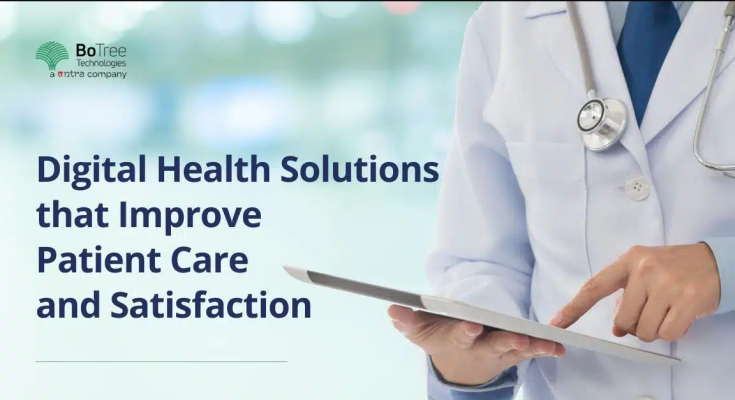Digital healthcare solutions have the potential to revolutionize the way healthcare is delivered by making it more accessible, efficient, and personalized. In addition, they aim to improve patient outcomes and healthcare delivery.
Technologies like Cloud Computing, Big Data Analytics, and Artificial Intelligence significantly advance digital health solutions. Today, clinicians and healthcare providers utilize data to prepare treatment plans in the early stages and deliver better outcomes.
Today, every healthcare facility has a digital healthcare strategy to serve its patients better. However, they also want to reduce the burden on their staff members. Digital solutions in healthcare enable facilities to automate certain tasks and leave the staff enough time to focus on patients.
On the other hand, a patient-centric digital health solution allows patients to connect better with their doctors and healthcare facilities. They can get online consultations, book appointments, access reports, get proper guidance, track their health, and do much more.
This article will highlight three digital health solutions that improve patient care and satisfaction. Let us look at them in detail.
3 Digital Health Solutions for Better Patient Outcomes
Digital health solutions are transforming the healthcare industry by improving patient care and satisfaction. Technology integration has brought numerous benefits to patients, healthcare providers, and the healthcare system.
Some benefits of digital health solutions include improved patient safety. They help to eliminate errors that can occur with traditional paper-based medical records, such as misfiled or lost records, handwriting legibility issues, or incomplete information.
Here is a detailed look at three digital health solutions that improve patient outcomes:
- Telemedicine
- Telemedicine enables patients to receive remote medical consultations and care through digital technologies, such as video conferencing, chat, or phone. It has drastically improved access to care, specifically for people living in rural or remote areas. They may need easy access to healthcare facilities, which is why telemedicine is a big advantage.
- With telemedicine, patients can receive care conveniently from their homes. It reduces the need for travel and the cost and inconvenience of physically visiting the facility. Amongst the most significant benefits of telemedicine is the reduction in wait times. Patients can get attention in a timely structure. They don’t need to wait for appointments or travel to a healthcare facility. This can result in higher patient satisfaction and improved health outcomes. Additionally, telemedicine is one of those digital solutions for healthcare that can reduce the risk of exposure to infectious diseases. This makes it a safer option for patients prone to catching the viral disease, especially the elderly.
- Telemedicine also offers higher flexibility and convenience for patients. They can get care outside of regular hospital hours and on weekends. This is especially beneficial for patients with busy schedules or who need immediate medical attention.
- Electronic Health Records (EHRs)
- EHRs are digital systems that store a patient’s health data in a centralized manner. It is accessible to all healthcare providers needed in their care delivery process. This healthcare digital health solution has significantly increased the accuracy and preciseness of a patient’s medical history, reducing the risk of medical errors and improving the quality of care.
- With EHRs, healthcare providers have access to the patient’s medical history. It includes previous treatments, medications, and test results, enabling them to deliver more personalized care. EHRs also facilitate correspondence between healthcare providers, ensuring that patients receive consistent and coordinated care. This is significant for patients with chronic conditions, who may see multiple healthcare providers and require ongoing care. EHR is one of the best digital medical solutions for improving communication and reducing the risk of medical errors. They lead to better patient outcomes and higher patient satisfaction.
- EHRs are an excellent tool for patient engagement. They enable patients to access their health data, track their health progress, and communicate with their healthcare facilities and clinicians. This can benefit by delivering better patient decisions as they are more likely to engage in healthy habits when they track their health.
- mHealth
- Today, mhealth app development solutions have become key in transforming digital health. Mobile health solutions simplify healthcare by enabling people to access healthcare at the top of their thumbs. It also allows patients to connect easily with healthcare providers, leading them to always stay on top of their health.
- mHealth solutions encourage patients to participate actively in their health and wellness management. It provides them access to necessary knowledge and tools that can elevate their understanding of their health. With healthcare web application development, facilities can build tools that allow patients to monitor their health and track their status over time. It drives them to make informed decisions about their healthcare. Additionally, mHealth solutions can offer patients direct communication with healthcare service providers, enabling them to receive the guidance and support they need.
- Another big benefit of mHealth is its capability to improve population health. It can deliver insights into patient segments, recognize trends and patterns, and inform the development of targeted healthcare app development solutions. For example, mHealth can assist with tracking the spread of infectious diseases and monitoring health outcomes. This can provide valuable data for public health agencies and healthcare providers. mHealth also enables better patient engagement, allowing patients to track their health progress, communicate with their healthcare providers, and receive health data and learnings in real-time.
Conclusion
Digital health solutions by a software development company are transforming the healthcare industry. They are contributing to better patient care and higher satisfaction.
With telemedicine, patients have access to care and reduced wait times. With EHRs, patients can get more accurate and transformative care. With mHealth, patients are encouraged to participate actively in their health and wellness. By utilizing technology for better access, quality, and efficiency, digital health solutions have the potential to transform healthcare delivery, improving patient outcomes and reducing costs. An enterprise software development company can help facilities and clinicians with digital health solutions and contribute to decreasing their workload and leading to better care delivery.


